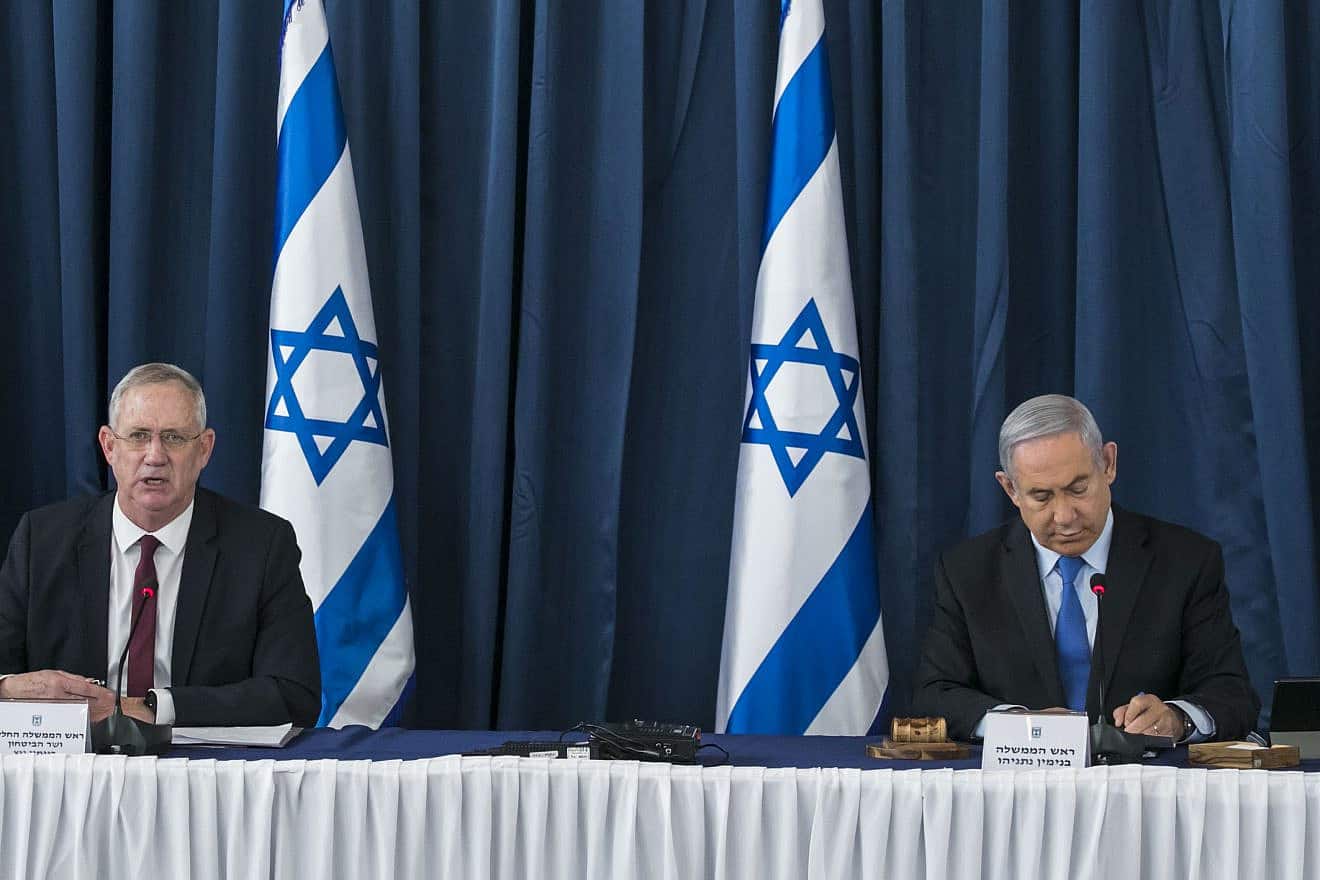Israeli Prime Minister Benjamin Netanyahu and then-Alternate Prime Minister and Defense Minister Benny Gantz at the weekly cabinet meeting, at the Ministry of Foreign Affairs in Jerusalem on June 28, 2020. Photo by Olivier Fitoussi/Flash90.
For the sake of Israel’s future, Netanyahu should drop his judicial reform campaign and form a government with Benny Gantz.
Israelis are abuzz about the once inconceivable possibility of normalization with Saudi Arabia. Indeed, Saudi Crown Prince Mohammed bin Salman (MBS) has publicly stated that the Saudis and Israel are getting closer to a normalization agreement every day.
The normalization process has been going on behind the scenes for many years, during which Saudi and Israeli intelligence and security services have quietly cooperated due to concerns about a predatory Iran. MBS also wants to take advantage of Israel’s high-tech expertise for his Vision 2030 plan to make the kingdom a leading player on the world stage. Over the last year, U.S. President Joe Biden has taken up the cause of normalization after disparaging the Saudis during the first years of his administration.
In this complex process, four parties want something from the other: the Saudis, the Israelis, the Palestinians and the Americans.
The Saudis want a civilian nuclear program with unspecified safeguards, advanced American armaments and a defense treaty similar to those between the U.S., Japan and South Korea. The Israelis, however, are very concerned about a possible Saudi nuclear program, since the kingdom’s leadership could change and revert to an anti-Israel posture.
The Americans want a quid pro quo from the Saudis. It would include not only normalizing relations with Israel but, more importantly, distancing themselves from China, America’s primary adversary in the 21st century and the Saudis’ largest fossil-fuel customer for decades to come.
In exchange for normalization, Israel is being asked—not so much by the Saudis but by the Biden administration—for significant concessions to the Palestinians. These include a settlement freeze, reining in illegal settlement outposts, land concessions in Israeli-controlled Area C of the disputed territories and reopening a Palestinian mission in Washington. If Israeli Prime Minister Benjamin Netanyahu grants any of these requests, his right-wing coalition will likely collapse.
The Palestinians may be willing to play ball this time, not in exchange not for a state, which is impossible at the moment for myriad reasons, but for much-needed Saudi cash. Moreover, unlike in the past, the Palestinians now believe the Saudis will prioritize their self-interests and normalize relations with Israel no matter what.
According to intelligence expert Eran Lerman writing in The Jerusalem Strategic Tribune, “One positive sign comes not from the Israeli but from the Palestinian side: unlike their petulant response to the Trump Administration’s economic ‘workshop’ in Bahrain in 2020, the Palestinian Authority chose to engage this time—with the Saudis, with American officials and even with Israel—and to seek some realistic ‘give’ that the Saudis would pose as a requirement to legitimize a future breakthrough in the eyes of their own people and the Arab world.”
Netanyahu knows his legacy will be cemented by Saudi-Israel normalization. However, he also knows he cannot give in to Biden’s demands without his right-wing partners bolting the coalition and bringing down his government. What can he do?
The answer could be to form a unity government with Benny Gantz, head of the opposition National Unity Party, who in the past served under Netanyahu as defense minister. The grand quid pro quo Gantz would demand is the suspension of the current government’s campaign for judicial reform.
A new coalition with Netanyahu will be difficult for Gantz to swallow, as the prime minister has betrayed him in the past, most notably when Netanyahu brought down a previous government despite coalition agreements that required him to rotate out of the premiership in favor of Gantz.
However, Gantz joined that government due to the Covid-19 pandemic, as other Israeli opposition leaders like Menachem Begin have done during periods of extreme crisis. This means that, if an issue pivotal to Israel’s future is at stake, Gantz might be persuaded to do so again.Netanyahu should seriously consider dropping his judicial reform campaign in order to bring Gantz into a coalition. This is not only the most promising path to normalization with Saudi Arabia, but also a way to heal the intense divisions that have racked Israeli society due to the reforms. A stable and unified Israel is in both Israeli and American interests. More importantly, it would create a united front composed of America, Israel and the Saudis against the growing menace of the expansionist ambitions of Iran.
Dr. Mandel is the director of MEPIN (Middle East Political Information Network) and Mandel Strategies, a consulting and advising firm for business and government officials in the Middle East, and regularly briefs members of Congress and their foreign policy aides.
